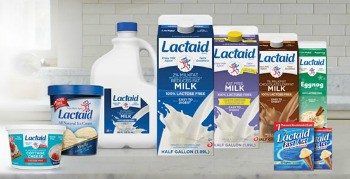
I have mentioned on numerous occasions that my oldest son is lactose intolerant. His reaction to lactose was quite severe when he was young, so we pulled all dairy from his diet. Now when he accidentally (or intentionally) ingests dairy his reaction hasn’t been as extreme. And sometimes, like when he consumes certain cheeses, he doesn’t have any reaction at all. So we have decided to start experimenting with his diet this summer and seeing exactly how much dairy he can handle.
Whenever I experiment with my kid’s diet, I try to do it during the summer because foods and reactions to foods can affect how they feel physically and emotionally. When they experience adverse reactions to foods, it can negatively impact their school and extra-curricular activities. My son finished his finals yesterday, so the experiment begins today!
We know my son can’t drink straight milk, so we are going to be trying Lactaid milk. I will also try using Lactaid products in some of my recipes. My son has been asking me to try Lactaid for a while, so I was happy to sit in on a conference about lactose intolerance with Melissa d’ Arabian, Celebrity Chef, author of Ten Dollar Dinners, and Lactaid Brand Spokesperson and Michelle Harrington , R.D. and LACTAID Regulatory and Nutritional Affairs Manager and learn more about dealing with lactose -intolerance. I found the information quite interesting and it helped explain why my son didn’t react negatively to some dairy products although he can’t drink milk. I am sharing the highlights below as well as a giveaway for a free Lactaid product:
What is Lactose?
Lactose is the major carbohydrate in milk and other dairy foods. It is also referred to as milk sugar. It consists of two simple sugars – glucose and galactose. Lactose must be broken down into glucose and galactose by the intestinal enzyme lactase before it can be absorbed by the body. The problem with lactose occurs when an individual doesn’t make enough lactase to break the lactose down into glucose and galactose.
What does it mean to be Lactose Intolerant?
Most people produce the natural enzyme, lactase, which breaks down lactose (sugar in milk). The amount of lactase your body produces will determine how much lactose your body can break down. Everyone produces different levels of lactase, which explains why people have varying levels of lactose intolerance. It is common for lactose intolerance to be progressive; many people develop a lactose intolerance later in life. However, my son started with an extreme reaction to lactose when he was young and it appears to be tapering off as he gets older which is why we are experimenting with allowing some dairy back into his diet.
What is LACTAID?
LACTAID® Products provides the lactase that the body can’t produce enough of, which helps lactose-intolerant individuals break down lactose. Lactaid dairy products are 100% real dairy, but they add a natural yeast-derived enzyme added called lactase to break down the lactose into more easily digested sugars.Their lactose-free products include milks, cottage cheese, ice -cream and eggnog. You can find the nutritional information for Lactaid products here.
Tips for eating with Lactose Intolerance:
- Lactaid Milk can be used one for one in place of milk in recipes.
- Important note: if someone who is lactose intolerant consumes products containing lactose on an empty stomach, they will be less likely to tolerate it. Eating lactose with other foods will help you digest it more easily.
- Many lactose-intolerant people find that yogurt doesn’t bother them because yogurt has live and active cultures in it that help breakdown the lactose.
- Harder cheese has less moisture or whey in it—as a result, it has less lactose in it. Aged Cheddar, Gruyère, Pecorino and Swiss cheeses will have less lactose in them than other cheeses, so some individuals can consume these cheeses.
Would you like to try a Lactaid product? Enter the giveaway below. The winner will be sent a coupon that they can use at their local store to receive a free Lactaid product of their choice.
We are sincerely hoping my son can add some dairy back into his diet. I will share some recipes using Lactaid next month and let you know how my son has handled adding dairy back into his diet.
This post and giveaway are sponsored by Lactaid and The Motherhood.


Roxanne D. says
Yes, I am lactose intolerant, my husband is and so is my son!! So horrible, right?!
Ttrockwood says
I am lactose intolerant!! 🙁
I love the lactaid brand cottage cheese!
Cindy W says
Great info and I love Lactaid Milk though it is expensive. I am lactose intolerant and my daughter has mild to moderate problems depending on the food. Her favorite food is lactose free ice cream